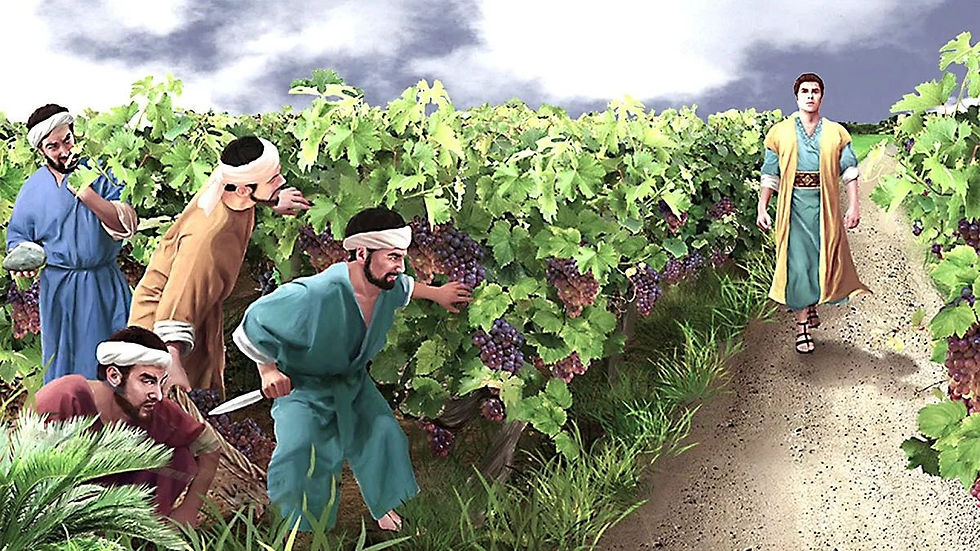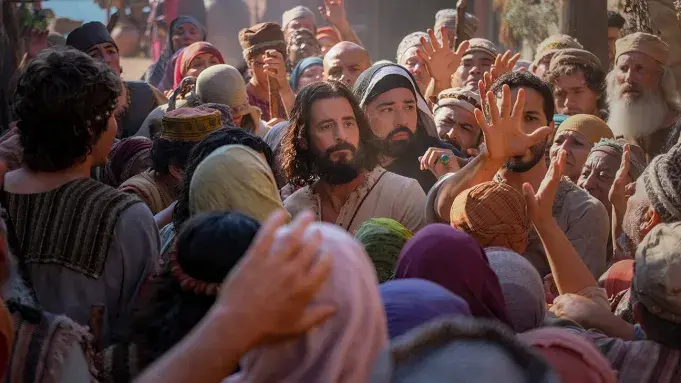The Parable of the Vineyard
- josnardionzon5
- Oct 9, 2023
- 5 min read

27th Sunday in Ordinary Time (A)
Readings: Is 5:1-7; Phil 4:6-9; Matt 21:33-43
Gospel Summary:
In today's Gospel reading (Matthew 21:33-43), Jesus tells a parable to the chief priests and elders. The story is about a landowner who plants a vineyard, leases it to tenants, and sends servants to collect the harvest. However, the tenants mistreat and kill the servants sent by the landowner. Finally, the landowner sends his son, hoping he will be respected, but the tenants plot to kill him, thinking they will inherit the vineyard. Jesus concludes the parable by asking what the landowner will do to those wicked tenants. The chief priests and elders respond that the landowner will bring those tenants to a miserable end and lease the vineyard to others who will give him the fruits in their seasons. Jesus then uses this parable to convey that the kingdom of God will be taken away from the religious leaders who reject Him and will be given to others who produce the fruits of faith and righteousness.
Gospel Reflection:
This Gospel is a continuation of Jesus' confrontation of the chief priests and the elders of the people. Jesus entered Jerusalem and praised by the people as "Son of David" and the prophet from Nazareth in Galilee. He cleansed the Temple and by doing this, he challenged the priestly authority as he claimed authority over the religious practices of Israel. He healed the blind and the lame and the chief priests and the scribes witnessed these wondrous things (the healings) and yet they do not "see" in contrast to the praises from the mouths of children. Thereafter, Jesus cursed the fig tree because it had no fruits which is an attack against Israel that despite its piety it did not bear fruits and because of this fruitlessness, it is judged and condemned. This is followed by the questioning of Jesus'authority. Thereafter, Jesus told the Parable of the Two Sons, and he told the chief priests and the elders of the people that the tax collectors and prostitutes will enter the Kingdom of God and they do not.
When Jesus talked about the vineyard, the chief priests and the elders understand his reference to Israel as God's vineyard and they, the religious leaders, were the tenants. In the history of Israel, the prophets, who were sent by God, were killed. The last one was John the Baptist, whom the tax collectors and the prostitutes listened to him, changed their minds and believed in him, was the last prophet who was killed. Jesus, a prophet himself, was brought to Pontius Pilate by Caiaphas, the Jewish high priest. He was killed due to his conflicts with the Jewish religious leaders.
The Responsorial Psalm says: "The vineyard of the Lord is the house of Israel." (Isa 5:7). This vineyard is described by the prophet Isaiah in his "Song of the Vineyard" which is a love song between God and His people, Israel.
In the first reading, The Song of the Vineyard, Isaiah describes how God built the vineyard in fertile soil on a hillside. "He spaded it, cleared it of stones, and planted the choicest vines; within it, he built a watchtower and hewed out a winepress." He even built a fence around it. In short, it was a labor of love.
But in the end, the vineyard owner was frustrated. Why? When he came to harvest, he found only wild grapes or stinking grapes.
Now, what should he do with his vineyard? He will "take away its hedge, give it to grazing, break through its wall, let it be trampled! Yes, I will make it a ruin: it shall not be pruned or hoed but overgrown with thorns and briers; I will command the clouds not to send rain upon it."
Today's Gospel continues Jesus's confrontation with the chief priests and the elders. Recall, last Sunday, Jesus told the Parable of Two Sons and said that the tax collectors and prostitutes would enter the kingdom of God before them. Here, he talks about the Parable of the Tenants.
A landowner leased his vineyard to tenants. Refer to the first reading as we described how the landowner carefully prepared the vineyard for a good harvest. Every harvest season, he sent a servant to collect his share of the produce. But the tenants always harmed the servants. One day, the landowner sent his son, thinking the tenants would respect him. However, like the other servants, the tenants harmed the son and killed him. The chief priests and the elders thought that as a result, the landowner would punish the tenants and lease his vineyard to other tenants.
Jesus told them: “Therefore, I say to you, the kingdom of God will be taken away from you and given to a people that will produce its fruit.”
The vineyard was the fruit of the landowner's labor of love. But when he came for the harvest, he found only sour grapes, not the fruit he expected. Isaiah was telling the House of Israel to remember how God took care of them, protecting them and nourishing them, but they did not appreciate His gift, His grace, and His love. They did not allow God’s love to grow and bear fruit. The fruits of the Kingdom of God are love, truth, justice, and peace.
***
For our Sunday reflection, let us ask ourselves how open we are to the love and care that God has poured out into our lives. Do we produce good, sweet fruits? Or do we produce bad, sour fruits?
In our lives, how many times do we forget that we are tenants, stewards, and caretakers and act as if we are the owners of the vineyard? We are called to collaborate with God in taking care of the vineyard. How have we fared so far? The bearing of fruits is to live virtuous lives.
***
Remember that Jesus addressed this parable to the religious leaders of Israel, highlighting their failure to take care of God's vineyard.
When church leaders (popes, cardinals, and bishops) covered up the crimes of abusive priests who sexually abused children, they neglected their duty to care for the vineyard. God is not blind, and justice will be served. Since we, the laity, are also tenants and caretakers to one another, we also have the duty to hold our religious leaders accountable. Why do we tend to look at them as gods and who planted the corrupted seed in our minds that to criticize the priests is to insult God?
When our religious leaders fail as our shepherds, what should we do? During elections, Filipino Catholics ignored toxic partisan politics and followed the dictates of conscience. Why we did not listen to our shepherds? Because they failed in their duties as shepherds. Thus, the laity decide for themselves, guided by their conscience, whom to vote to lead the country.
The so-called "listening" to the voices of those at the margins of the church and society isn't truly authentic when the representation of the laity's voice comes from clericalized laypeople in the church. Despite efforts to gather those who felt excluded, there were only a few, if any, responses, particularly from the depressed communities where religious individuals are journeying with them.
***
Let us pray for peace in Israel and Palestine.



Comments